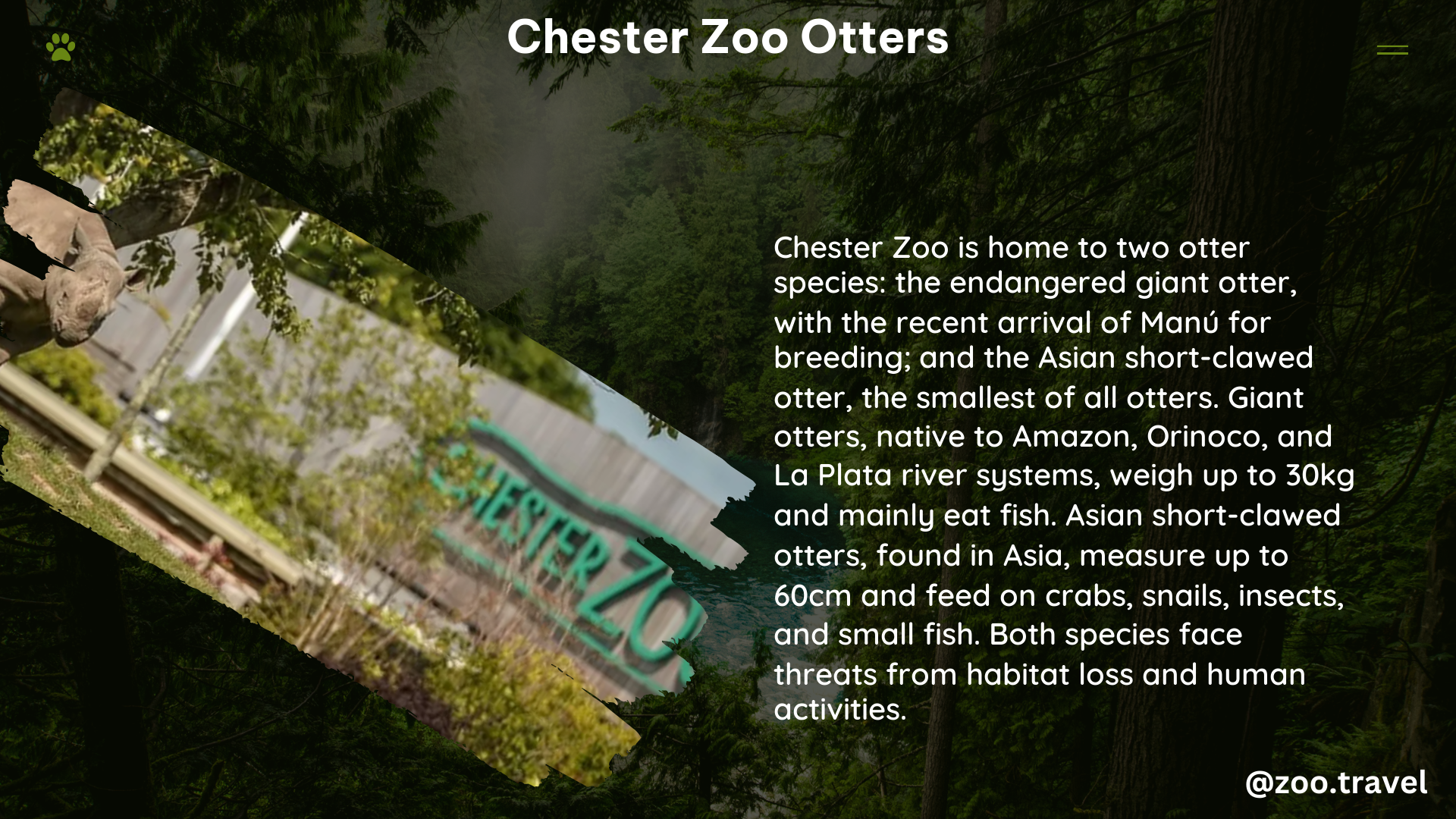Chester Zoo is home to two captivating otter species: the Giant Otter and the Asian Short-Clawed Otter. These remarkable creatures captivate visitors with their playful antics and unique adaptations, making them a must-see attraction at the zoo.
Species Overview
The Giant Otter, also known as the “river wolf,” is the largest otter species, weighing up to 30kg and reaching up to 1.1 meters in length. In contrast, the Asian Short-Clawed Otter is the smallest of all otter species, with a length of around 60cm.
Habitat and Diet

Giant Otters are native to the Amazon, Orinoco, and La Plata river systems, where they dwell in swamps, flooded forests, and slow-moving rivers. Their diet primarily consists of fish, which they catch with expert skill using their wing-like tail and webbed feet for propulsion in the water.
Asian Short-Clawed Otters, on the other hand, reside in swamps and freshwater rivers across Asia, from India and Nepal to the Philippines, Indonesia, China, Singapore, Malaysia, and Thailand. Their diet mostly consists of crabs, snails, insects, and small fish.
Conservation Efforts
Both species are threatened by human activity, including habitat destruction, pollution, and hunting for their fur and organs. Chester Zoo plays a crucial role in conservation efforts, participating in international breeding programs to help protect these species from extinction.
Breeding Programs
A recent addition to Chester Zoo is Manú, a three-year-old male Giant Otter from Budapest Zoo, who has joined the zoo’s breeding program. Manú has been paired with eight-year-old female Giant Otter, Tibiri, based on their significant genetics, age, and compatible temperament, with the aim of contributing to the global Giant Otter population.
Visitor Information
Visitors to Chester Zoo can learn more about these fascinating creatures and support conservation efforts by visiting the otter enclosures during their visit.
Donations
Donations to Chester Zoo’s ACT FOR WILDLIFE program go directly towards conservation efforts, with 100% of donations supporting the zoo’s work in preventing extinction.
Here are some additional facts about the Chester Zoo otters:
Giant Otters
- Lifespan: 12-15 years in the wild, up to 20 years in captivity
- Habitat: Slow-moving rivers, lakes, and swamps in the Amazon basin
- Diet: Primarily fish, but also crustaceans, amphibians, and small mammals
- Behavior: Highly social, living in family groups of up to 10 individuals
- Conservation Status: Endangered, with an estimated 5,000-6,000 individuals remaining in the wild
Asian Short-Clawed Otters
- Lifespan: 12-15 years in the wild, up to 21 years in captivity
- Habitat: Freshwater rivers, streams, and wetlands in Asia
- Diet: Crabs, snails, insects, and small fish
- Behavior: Highly social, living in family groups of up to 15 individuals
- Conservation Status: Vulnerable, with a declining population due to habitat loss and hunting
By visiting Chester Zoo and learning about these fascinating otter species, you can support the zoo’s conservation efforts and help protect these remarkable animals for future generations.
References:
– BBC News – Chester Zoo welcomes rare giant otter Manú for breeding programme
– Chester Zoo – Are you bigger or smaller than an otter?
– Chester Zoo – Giant Otter
– Chester Zoo – Asian Short-Clawed Otter
– Chester Zoo – Chester Zoo welcomes rare giant otter Manú for breeding programme
